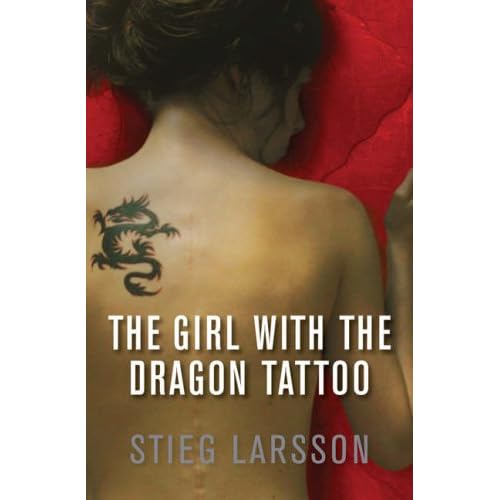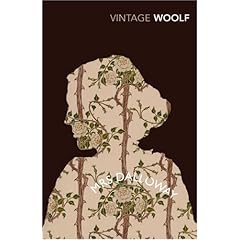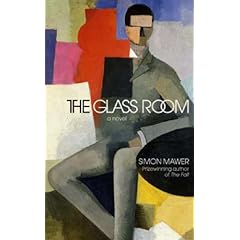 Stieg Larsson's The Girl With The Dragon Tattoo has dominated the bestsellers' chart this year, and the Swedish author has received much acclaim posthumously (Larsson died of a heart attack at the age of just fifty). It first came to my attention about a year ago (February 2009), and I added it to my ever-growing list, but, was quick to discount it as another "Da Vinci Code" - lots of hype, minimal substance. Finally though, the crime-thriller-lover in me gave in, and for that I'm grateful. I enjoyed the book thoroughly, but simultaneously, some aspects of it annoyed me a fair bit.
The Girl With The Dragon Tattoo is the first book in the Millennium series, and in its opening pages, the reader is introduced to the main protagonist of the story, Mikael Blomkvist, a disgraced financial journalist, who has just lost a libel case (against one of the business tycoons), and simultaneously, forced to temporarily relieve himself of his job at the small independent magazine, Millennium, which founded along with his best friend, Erika.
Stieg Larsson's The Girl With The Dragon Tattoo has dominated the bestsellers' chart this year, and the Swedish author has received much acclaim posthumously (Larsson died of a heart attack at the age of just fifty). It first came to my attention about a year ago (February 2009), and I added it to my ever-growing list, but, was quick to discount it as another "Da Vinci Code" - lots of hype, minimal substance. Finally though, the crime-thriller-lover in me gave in, and for that I'm grateful. I enjoyed the book thoroughly, but simultaneously, some aspects of it annoyed me a fair bit.
The Girl With The Dragon Tattoo is the first book in the Millennium series, and in its opening pages, the reader is introduced to the main protagonist of the story, Mikael Blomkvist, a disgraced financial journalist, who has just lost a libel case (against one of the business tycoons), and simultaneously, forced to temporarily relieve himself of his job at the small independent magazine, Millennium, which founded along with his best friend, Erika.
Out of a job, and in a bit of a financial flux, an offer comes to him by way of Henrik Vagner, an industrialist who offers Blomkvist over 2 million kroner, to write a memoir of the Vagner family. However, what Vagner really wants the journalist to do is solve a forty year old murder mystery - Harriet, Vagner's niece, disappeared from the small island one fateful day, and no one had heard from her since, leading to the only reasonable conclusion: she had fallen victim to foul play. Despite his (and Erika's) better judgment, Blomkvist does take up the job, and gets caught up in the web of part thieves, misers, bullies and incompetents, that makes up the Vagner family tree. Some members are pro-Nazi, some reclusive, some downright crazy, and all, it seems, with secrets to hide!
Considering the task at hand (solving a mystery forty years old, where all the evidence has been examined and cross-examined, and all the clues washed up), Blomkvist is convinced that he will not find anything. However, as the story takes its course, he comes face to face with "the girl with the dragon tattoo", Lisbeth Salander. Salander is a complex lonely character, with multiple tattoos and piercings. She has her own sense of morality, does not abide by the country's law, has serious intimacy issues, has photographic memory and is a genius hacker - a skill that comes in handy, as Salander acts as his research assistant and co-investigator.
The book picks up pace, and once you're in the midst of all the action, it's almost impossible to put down the book (note: I was up 'til half two in the morning finishing this book, on Wednesday, when I had to go to work Thursday!). You see Salander dealing with the troubles in her life her own way, acting on her own impulses; Blomkvist trying to escape the media circus around his name; Vagner desperate to solve a mystery that has consumed his whole life; and a myriad of other characters who seem to have their own whims and fancies.
Also, while on the face of it, this is a crime thriller, the book explores many other themes as well, specially those of misogyny and anti-Semitism. Initially, the book was called, Men Who Hate Women, and that should give the reader an idea as to what to expect, and trust me - at times, some of the more sadistic scenes will make you want to turn the page as fast as possible, while simultaneously, you won't be able to peel your eyes away from a single word!
So, yes, the book is engrossing and it's a pure page turner. Yet, it needs to go under the editor's red pencil once again - I have serious doubts about it even being edited just the once. There's some poor grammar, and while I do like descriptive writing, there is something called going overboard...
The office was a rectangle of more than 120 square meters. One wall was dominated by a floor-to-ceiling bookshelf nine metres long containing a remarkable assortment of literature: biographies, history, business and industry, and A4 binders. The books were arranged in no apparent order. It looked like a bookshelf that was used. The opposite wall was dominated by a desk of dark oak. On the wall behind the desk was a large collection of pressed flowers in neat meticulous rows.
Only the last line of the above paragraph has anything to do with the plot of the novel! Two hundred odd pages could have easily been slashed.
There are also too many characters, and I had to continuously look at the family tree charted at the beginning of the book, to keep track of who's who. I got the feeling that not all the characters were essential, but, they existed to make the book slightly more confusing.
Finally, I've always associated product placement with movies and TV shows, but never with books. However, this entire book had so many brand references, that it made me wonder - is this the future? Books being used to "place" products in the market as well?
The loss of her computer was depressing, but not disastrous. Salander had had an excellent relationship with it during the year she owned it. She had backed up all her documents, and she had an older desktop Mac G3 at home, as well as a five year old Toshiba P.C. laptop that she could use. But she needed a fast modern machine.
Unsurprisingly, she set her sights on the best available alternative: the new Apple PowerBook G4/1.0 GHz in an aluminium case with a Power PC 7451 processor with an AltiVec Velocity Engine, 960 megs of RAM and a sixty gig hard drive. It had BlueTooth and built in C.D and D.V.D. burners.
The above mentioned laptop spec is already outdated, and PowerBooks haven't existed for a few years now, but, that's not the point. Not only do descriptions like the above prevent the book from becoming as timeless as it could be, but, it's also descriptions that most readers don't care about. Don't get me wrong - I love everything Apple, and hate most things Microsoft, but, the random incessant name-dropping is a turn off.
If you can deal with some ramblings, and bad editing, this book comes highly recommended. I'm already half way through the second book, so, I think that speaks for itself. However, if you're pedantic about things like that, and don't indulge yourself in much "guilty pleasures," maybe you should skip this one?
Rating: B-
 Background: This is the final book read, as part of the
Background: This is the final book read, as part of the  This incredibly poignant well written story tackles various important and sensitive topics, some of which are still valid today, despite the book being set around the time of the second World War.
This incredibly poignant well written story tackles various important and sensitive topics, some of which are still valid today, despite the book being set around the time of the second World War.

 Background:
While this month, my blog entries seem to be focused a lot on the
Background:
While this month, my blog entries seem to be focused a lot on the  I
I  Background:
I ended up picking this book for the
Background:
I ended up picking this book for the 




 I absolutely loved
I absolutely loved  Dodie Smith's
Dodie Smith's